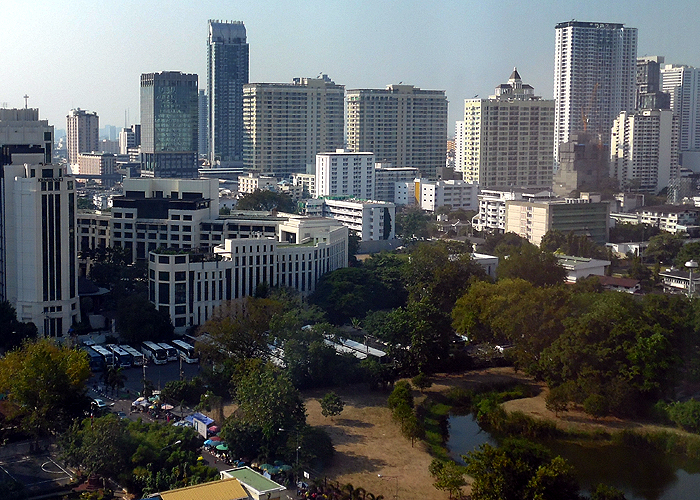Bangkok’s property market is expected to fare better than expected during 2015, with real estate firm JLL expressing cautiously optimism about the year ahead.
In its most recent research, the agency noted the Bangkok property market performed moderately well overall in 2014. Though all property sectors across the city were hit by the political turmoil in the first half of the year, conditions in most sectors picked up in the second half year as the political situation started stabilizing. Whilst an ongoing dim economic outlook has overshadowed prospects in the Bangkok property market, JLL expects the market in 2015 to perform better than last year.
Suphin Mechuchep, Managing Director of JLL, said: “The Bangkok property market was generally resilient in 2014. All of the property sectors JLL monitors, including offices, retail centres and luxury condominiums, continued to register growth in rents and selling prices.
“Among a number of key factors that helped prevent these property sectors from crash in 2014 were a generally fair balance of supply and demand and the return of political stability in the second half of the year.”
There are a number of factors that make JLL optimistic about the outlook for 2015:
- While the political situation has stabilised, the country’s reform roadmap should allow for more clarity in policy and the direction. Thailand’s economy is heading, helping improve business sentiment and consumer confidence.
- The government’s stimulus package, spending and investment in infrastructure projects are expected to start showing impact on the country’s macro economy this year, and consequently boost demand in Bangkok’s different property sectors.
- Economists anticipate interest rates to stay in a low regime in 2015. While this will benefit developers in all property sectors who rely on lending, low interest rates contribute greatly to affordability of home buyers.
- Global oil prices have more than halved since June 2014 and, for the first time since 2009, Brent crude oil dipped below US$50 a barrel. While the reduction in oil prices will benefit the overall economy and indirectly the property industry, the residential and retail markets will benefit from improving household balance sheets, as energy costs absorb less consumer income.
- Most major developers and investors have remained well-capitalised and showed strong appetite to acquire existing incomegenerating property assets or suitable land for new development.
- Real Estate Investment Trusts (REITs) was introduced in 2014 to replace property funds. The new investment vehicle offers higher flexibility and efficiency. For example, REITs can wholly own a property holding business and invest in both ongoing and greenfield (with limitations) projects, and both domestic and foreign income generating properties. Furthermore, there are fewer
- limitations on REITs in terms of the types of assets that can be included. The transition to REITs is a significant positive step and should encourage future growth across the different property market sectors.
However, there is also a set of challenges, particularly with regards to Thailand’s economy which demand in most property sectors relies largely upon.
- While Thailand’s GDP is forecast to grow by approximately 4 percent in 2015, economic uncertainty remains, due to a number of both internal and external factors such as the fragile global economic outlook.
- High household debts will continue to confine the growth of demand for mid to low priced condominiums and houses.
Further, in the high-end condominium market with units priced at THB150,000 per sqm and above, JLL saw no new projects launched in the first half of 2014 reflecting developers’ high concern over political uncertainty.
As the political stabilised, the market saw 1,140 new units launched in the second half year, a similar amount of the total new launches in 2013.
Despite high selling prices and strong competition in the leasing market, investors continue to purchase luxury condominiums. While these investors can expect low investment yields averaging 3.5 percent, their purchase decisions are based more on the hope of achieving capital gains in the short and long terms.
In most cases, when construction completes, prime condominiums in the CBA enjoy a 20 percent increase in prices from when they were offered for sale off-plan.
In the long term, capital values of condos in the CBA are likely to rise further due to the less availability of land in prime areas for future development and a continued increase in land prices, which will push up prices in future condominium projects.
Andrew Batt, International Group Editor of PropertyGuru Group, wrote this story. To contact him about this or other stories email andrew@propertyguru.com.sg





